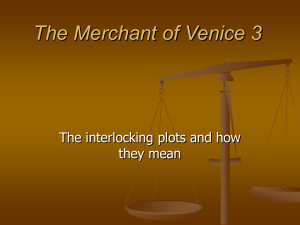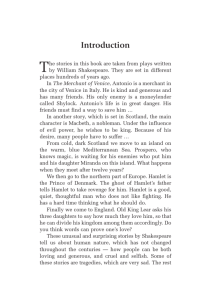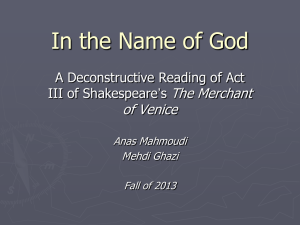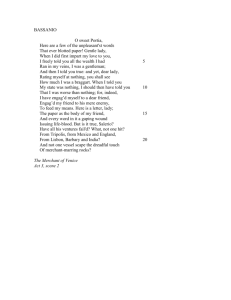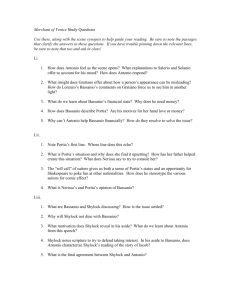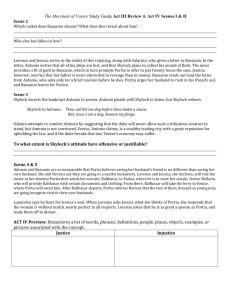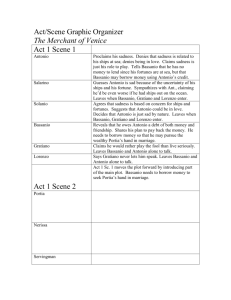File - The Merchant of Venice
advertisement
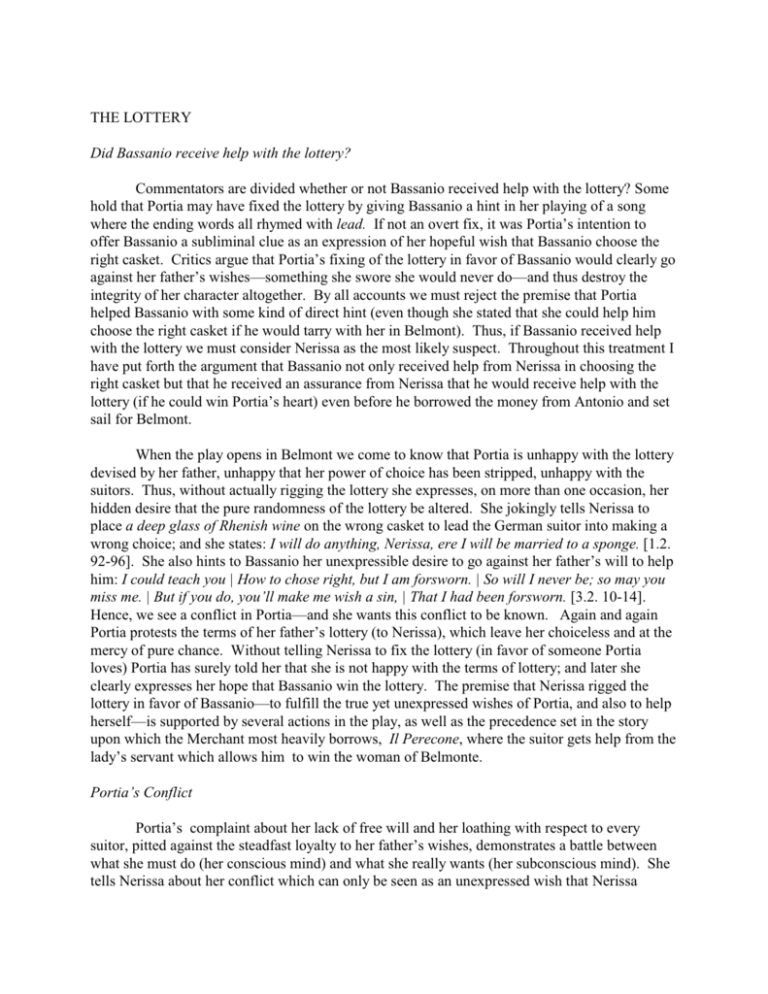
THE LOTTERY Did Bassanio receive help with the lottery? Commentators are divided whether or not Bassanio received help with the lottery? Some hold that Portia may have fixed the lottery by giving Bassanio a hint in her playing of a song where the ending words all rhymed with lead. If not an overt fix, it was Portia’s intention to offer Bassanio a subliminal clue as an expression of her hopeful wish that Bassanio choose the right casket. Critics argue that Portia’s fixing of the lottery in favor of Bassanio would clearly go against her father’s wishes—something she swore she would never do—and thus destroy the integrity of her character altogether. By all accounts we must reject the premise that Portia helped Bassanio with some kind of direct hint (even though she stated that she could help him choose the right casket if he would tarry with her in Belmont). Thus, if Bassanio received help with the lottery we must consider Nerissa as the most likely suspect. Throughout this treatment I have put forth the argument that Bassanio not only received help from Nerissa in choosing the right casket but that he received an assurance from Nerissa that he would receive help with the lottery (if he could win Portia’s heart) even before he borrowed the money from Antonio and set sail for Belmont. When the play opens in Belmont we come to know that Portia is unhappy with the lottery devised by her father, unhappy that her power of choice has been stripped, unhappy with the suitors. Thus, without actually rigging the lottery she expresses, on more than one occasion, her hidden desire that the pure randomness of the lottery be altered. She jokingly tells Nerissa to place a deep glass of Rhenish wine on the wrong casket to lead the German suitor into making a wrong choice; and she states: I will do anything, Nerissa, ere I will be married to a sponge. [1.2. 92-96]. She also hints to Bassanio her unexpressible desire to go against her father’s will to help him: I could teach you | How to chose right, but I am forsworn. | So will I never be; so may you miss me. | But if you do, you’ll make me wish a sin, | That I had been forsworn. [3.2. 10-14]. Hence, we see a conflict in Portia—and she wants this conflict to be known. Again and again Portia protests the terms of her father’s lottery (to Nerissa), which leave her choiceless and at the mercy of pure chance. Without telling Nerissa to fix the lottery (in favor of someone Portia loves) Portia has surely told her that she is not happy with the terms of lottery; and later she clearly expresses her hope that Bassanio win the lottery. The premise that Nerissa rigged the lottery in favor of Bassanio—to fulfill the true yet unexpressed wishes of Portia, and also to help herself—is supported by several actions in the play, as well as the precedence set in the story upon which the Merchant most heavily borrows, Il Perecone, where the suitor gets help from the lady’s servant which allows him to win the woman of Belmonte. Portia’s Conflict Portia’s complaint about her lack of free will and her loathing with respect to every suitor, pitted against the steadfast loyalty to her father’s wishes, demonstrates a battle between what she must do (her conscious mind) and what she really wants (her subconscious mind). She tells Nerissa about her conflict which can only be seen as an unexpressed wish that Nerissa somehow intervene favorably on her behalf. Portia, bound to follow her father’s will, is trying to find a way to express her own will, and put it into place, without actually expressing it. Nerisssa, it seems, without being told (like the conscious mind which pick up on the clues being afforded to it by the subconscious), picks up on Portia’s clues and unexpressed wishes—and, as the loyal servant, endeavors to find a way for Portia’s wish to be expressed (and for her to get the suitor that she wants) and for her to remain loyal to her father’s will. This is what Portia wants without actually saying it. Hence, Nerissa does find a way for Portia to get what she wishes for and also to remain loyal to her father’s wishes—and that culminates in a plan where she comes to help Bassanio with the choice (without telling Portia about it) and without actually telling Bassanio which casket to choose. In the end she tells Bassanio to listen carefully to the song for a clue as to which casket to choose. (Hence, if Nerissa were asked if she told Bassanio which casket to choose, she could truthfully say ‘no.’) The Song Many people hold that the lottery may have been fixed (by either Portia or Nerissa) due to the end-rhymes of each word of the song, played during Bassanio’s choice, all rhymed with lead. In it’s simplest explanation, no prior hint plan was made between Nerissa and Bassanio, and Bassanio was given no hint to listen to the song. Then song was simply played, and the endwords were included as a hint, and Bassanio was left to his own devices to pick up on the clue and heed it. More likely—and the plan advocated here—and a plan involving far less risk, given the status of Bassanio’s wit—would be that a message was gotten to Bassanio (by Nerissa) telling him to listen to the song for a hint. Thus, with such a direction, it would have been much more likely for Bassanio to link the end words bred, head, and nourishèd, with the word lead. Tell me where is fancy bred, Or in the heart, or in the head, How begot, how nourishéd? Reply, reply. In some productions, (such as in Komisarjevsky’s) Bassanio is a charming yet somewhat dimwitted fellow. Revealing his true motives, he tarry’s at the chest of gold, about to pick it, when Nerissa, takes to singing the song again, now fully emphasizing the rhyming words: “Tell me where is fancy BRED, or in the heart or in the HEAD. . . ” Bassanio picks up on the hint and chooses the lead casket. The Original Story — Il Perecone In a story found in Il Perecone—the story upon which The Merchant is based—the contest to win the lady of Belmont was a little different: the contest would be won by whichever suitor could satisfy the lady of Belmonte by making love with her. If a man could make love with her—all night long—to her satisfaction—then he would get her and all her wealth. If he could not, then he would lose everything he had. Yet there was deceit built into this contest, as the lady’s maid drugged all the suitors with a sleeping potion which put them fast to sleep, and prevented them from satisfying her. They all fell asleep, only to wake the next morning with all their goods forfeited. Giannetto, who is Bassanio in our story, gets drugged several times, each time losing all the goods on his uncle’s ship (who is Antonio in our story). Finally, he gets some help from a sympathetic servant (telling him not to drink the wine) and he is able to stay up all night and win the lady: From Il Perecone —Giannetto’s first night: Night coming on, the lady took him by the hand and led him to her chamber and said, “I think it is time to go to bed.” “Lady, I am at your service,” replied Giannetto; and at once two damsels entered, one with wine and the other with sweet-meats. The lady said, “I know you must be thirsty, so take a drink.” Giannetto took some sweet-meats and drank some wine, which was prepared in such a way that it induced sleep; and he did not know this and took half a cup, since he found it to his taste; and at once he undressed and went to bed, and as soon as he reached it, he fell asleep. Giannetto’s last night: When the time came to go to rest, the lady took Giannetto by the hand and said, “Let us go to rest”; and when he was passing the door of the chamber, one of the lady’s maids, who was sorry for Giannetto, put her mouth to his ear and whispered, “Pretend to drink, but do not drink tonight.” Giannetto understood what she said, and having entered the chamber the lady said, “I know you are thirsty, and I want you to drink before you go to bed”; and immediately two damsels who looked like angels, came with wine and sweet-meats in the usual way, and offered him a drink. “Who can refuse to drink when the two damsels are so beautiful?“ said Giannetto, whereupon the lady smiled. Giannetto took the cup, and seemed to drink, pouring the wine into his breast, and the lady believed that he had drunken and said to herself, “You must bring another ship, for you have lost this one.” Giannetto went to bed feeling clear-headed and in good spirits, and it seemed a thousand years before the lady came to bed; and he comforted himself by thinking that he had certainly caught her, that he had found a different way of doing things. And so the lady would come to bed sooner, he began to pretend to snore and be asleep. Therefore the lady said, “This will do,” and at once undressed and came to bed to Giannetto; he lost no time, but as soon as the lady was in bed he turned towards her, and embraced her and said, “Now I have what I desired so much” and therewith he gave the satisfaction of wedlock, and all night long she lay in his arms; and the lady was highly pleased with him, and rose early in the morning and sent for all the lords and knights, and many other citizens and told them, “Giannetto is your lord, and therefore celebrate.” In Il Perecone, the hero receives help right before he enters the contest, and many commentators hold that Bassanio only received help when he was right in front of the caskets, with no previous assurance that he would receive help. The premise argued here is that Bassanio not only got direct help from the song, but that he got an assurance that he would get help, long before he even arrived on Belmont. Moreover, this assurance that he would receive help (under the proviso that he could win Portia’s heart) is what prompted Bassanio to come to Belmont (and borrow money to do so) in the first place. (And this assurance came in a secret meeting, had between himself and Nerissa, that he would get help from her in choosing the right casket, if Portia, by her own choice, fell in love with him. And Bassanio, the eternal charmer, was confident that he could get Portia to do just that). Secret Pilgrimage We hear of a secret pilgrimage from Antonio, who was told about by Bassanio. With whom did Bassanio meet in this secret pilgrimage? The pilgrimage was secret and so he never revealed the identity of the lade he met with. Certainly is was not Portia, who could not sneak away from Belmont for such a meeting. Then who was it and why is it even mentioned in the play? We must assume that the secret pilgrimage was with Nerissa. Bassanio promised to tell Antonio about this secret pilgrimage, and indeed he does tell him—but he only tells Antonio about the content of the meeting, what he learned in the meeting, but he does not tell Antonio about the identity of the woman he met with, nor the details of any plan that came from the meeting (or indeed the reason for having a secret meeting in the first place). Why was the meeting secret if not to keep in confidence the nature of the meeting and its lady participant? (Clearly is Bassanio revealed that he met with Nerissa, the whole scheme of his plan would become known). Well, tell me now about this same lady To whom you swore a secret pilgrimage That today you promised to tell me of. [1.1.119-121, Antonio] Bassanio’s Assurance What prior knowledge allowed Bassanio to be so confident, to questionless be fortunate, (that he would win Portia) in his pleadings to Antonio? He cited to Antonio that Portia looked on him with favor, that perhaps he had won her eye, but none of this could help him win her, since the lottery, so devised, had nothing to do with Portia’s choice nor did it give one doit of favor to one upon whom Portia looked upon with favor. (In a normal situation, where suitors are vying to win the favor of a lady, such glances would be relevant—but not in this case. In the case where Bassanio was told, by Nerissa, that he would get help with the lottery if he could win the favor of Portia, then Portia’s glances again become relevant. Antonio, of course, assumes that the former case is true). In Belmont is a lady richly left, And she is fair and, fairer than that word, Of wondrous virtues. Sometimes from her eyes I did receive fair speechless messages. [1.1.161-64] How is it that Bassanio is so sure that he will win the lottery, even to the point of putting his best friend’s life in jeopardy? O my Antonio, had I but the means To hold a rival place with one of them, I have a mind presages me such thrift That I should questionless be fortunate. [1.1.173-76] The drawing of the lottery is three to one odds against him; with such odds, Bassanio would have no mind to presage such thrift (gain), not would he be questionless. (Bassanio, however, never tells Antonio about the random terms of the lottery). What makes Bassanio so certain, and so certain that he tells his best friend he is certain? Bassanio seems to have some kind of unwordly assurance that he will questionless be fortunate. But Bassanio gives no reason to support this premonition. (The only thing he could actually say was that he received an assurance from Nerissa that he would get help with the lottery if he could win Portia’s love—which he is sure he can do; but such a plan would not stand within the eye of honour. Clearly, in normal circumstance, the odds of winning, being fortunate, are three to one against him. These are chances which are far from certain—but he never tells this to Antonio, nor about the lottery itself. What he tells Antonio about is the prize, and his chances of winning it: Bassanio is already in debt up to his ears—which is clear indication of irresponsible and reckless action. He’s already in debt to Antonio, which he cannot repay. And now, he is asking to borrow additional money from Antonio. This could be seen as an abuse since Bassanio knows that Antonio does not have the power to refuse him—and it would certainly be less than honorable had Bassanio placed all of Antonio’s wealth on a one to three chance wager. But something has given Bassanio a questionless assurance, with a winning chance far greater than 1 in 3, and so he borrows the money from Antonio with the full confidence that he will be able to repay it. With an prior assurance of victory, Bassanio borrows money from Shylock. When he hears the terms of the bond, and realizes that his friend is putting up his life as collateral for his loan, Bassanio levies a protest— but his protest is neither staunch nor convincing. Antonio assures him that his ships will come in. Despite the risks, Bassanio allows Antonio to put up his own life in order that Bassanio have enough money to get to Belmont. Is Bassanio sure that Antonio will be able to pay back the loan (as assured by Antonio) or is he sure that he will win the lottery and be able to pay back Antonio before the loan is due? Perhaps both. Nerissa Mentions Bassanio How does Nerissa come to talk about Bassanio to Portia, suggesting him as a potential suitor, when there was nothing to warrant or support this dialogue? Why would she mention Bassanio in this connection? Bassanio had no wealth, so why would he be mentioned as a potential suitor? Yet, Nerissa mentions Bassanio by name, in 1.2, even before Morocco makes his choice. (It seems that Nerissa knew that Portia took a liking for Bassanio—and Bassanio knew it as well. Based upon this known interest, Nerissa met with Bassanio and devised a plan by which he could win Portia. The plan had already been put in place when the first scene opens in Belmont. Here Nerissa is simply confirming with Portia what she already knows—that Portia looked on Bassanio with favor.) —Nerissa Do you not remember, lady, in your father’s time, a Venetian, a scholar and a soldier, that came hither in company of the Marquis of Montferrat? —Portia Yes, yes, it was Bassanio—as I think so was he called. —Nerissa True, madam. He of all the men that ever my foolish eyes looked upon was the best deserving a fair lady. —Portia I remember him well, and I remember him worthy of thy praise. [1.2.109-118] It was surely known, when Bassanio first came to Belmont, that he was not a man of wealth. Here Nerissa paints him with the high praise of a Renaissance man—a soldier and a scholar. Yet Bassanio is neither a man of wealth, nor a soldier, nor a scholar. This is a completely fictitious account! In fact, by his own admission, he is a wasteful spendthrift, who lives beyond his means. Clearly Nerissa’s efforts to paint a flattering—and untrue—picture of Bassanio is part of her overall agenda. (How does she come to mention and praise Bassanio out of the blue? What prompted this being that Bassanio was not a suitor, nor did he fit the social position of a wouldbe suitor?) It seems that Bassanio did not even speak to Portia during his visit, as all we hear about are Portia’s favorable glances. She recalls his name but nothing more about him. Thus it appears odd that Nerissa not only recalls Bassanio, and his name, but that she brings him up in the context of Portia’s potential suitors, and also that she promotes him in a favorable light. For what reason? Bassanio is hardly the Renaissance man that Nerissa makes him out to be. So what is prompting Nerissa to speak of Bassanio and in such a favorable light? Clearly Nerissa’s concern for Portia is foremost, and she would never rig the lottery in a way harmful to Portia; here she is trying to determine if Bassanio is someone that Portia might choose willingly. (And Portia confirms this). Nerissa Hopes that Bassanio has Arrived At the close of Act 2.9 Nerissa confirms her foreknowledge of Bassanio’s arrival. How does she come to know, and hope for, Bassanio’s arrival? We hear a messenger tell of a young Venetian who is at the gates to announce of the approach of his lord—and no one has any idea of whom the suitor could be. So how does Nerissa rightly guess that the young Venetian at the gate is there to tell of Bassanio’s approach? When Portia hears the praise regarding this suitor (which is exaggerated to the max) she responds with a half-mocking jest but is curious to see who might be worthy of such praise. Nerissa, on the other had, already seems to know whom the suitor might be. (How does she come to know this?) When she hears that a young Venetian has come to announce his lord she is guessing, and hoping, that the messenger has come to announce Bassanio. Nerissa’s surmise as to who was at the gate could only be made if she were privy to some prior arrangement and had foreknowledge of Bassanio’s arrival (which would have come with a prior, secret meeting). —Messenger Madam, there is alighted at your gate A young Venetian, one that comes before To signify th’approaching of his lord, From whom he bringeth sensible regreets . . . —Portia ... Come, come, Nerissa; for I long to see Quick Cupid’s post that comes so mannerly. —Nerissa Bassanio, Lord Love, if thy will it be! [2.9.85-88; 98-100] How does Nerissa know that the suitor might be Bassanio, and why does she wish it to be so? Hoping that Bassanio has come to woo Portia, it is possible that Nerissa is equally hoping that Gratziano has come along with him, and has come to woo her. (In this regard, we must ask how Nerissa came to learn of Bassanio, and how she came to meet with him in secret. One explanation is that she had a chance meeting with Gratziano, even before she met with Bassanio, and it was from Gratziano that she learned about Bassanio. Then she recalled that Bassanio had been to Belmont, and that Portia looked upon him with favor. Etc.). Hence, we can suspect that there was a prior meeting between Nerissa and Gratziano before the “secret pilgrimage” (between Bassanio and Nerissa) was planned. Assuming that a prior, chance meeting took place between Nerissa and Gratziano—which sparked a love interest—adds some weight to the unlikely event that Nerissa and Gratziano met, fell in love, and were married within two days. This also explains why Gratziano was so eager to go with Bassanio to Belmont, and why Bassanio agreed that he could go even before Gratziano asked that his suit be granted. Bassanio does not Delay in Belmont Another piece of evidence which suggests that Bassanio was assured we would receive help in the lottery is that, upon his arrival in Belmont, he wants to make his choice without delay. Even at the request of Portia, who suggests that by his tarrying in Belmont (for a month or two) that he might learn some things that would enable him to chose the correct casket, Bassanio is unwilling to tarry even one day. Portia states: I pray you, tarry. Pause a day or two Before you hazard, for in choosing wrong I lose your company. Therefore forbear a while . . . I would detain you here some month or two Before you venture for me. I could teach you How to choose right, but then I am forsworn. [3.2.1-3; 9-11] We cannot take this line, before you hazard, as a conscious tip off by Portia, even though the lead casket, which contains her picture, reads, ‘Who chooseth me must give and hazard all he hath.’ Hazard, in this context, simply refers to the seeming risk that Bassanio must take. However, Bassanio does not want to delay in making his choice, not even a day. Portia is afraid that if he chooses wrong that she will forever lose his company, and so she wants to spend a month or two with him, eke out the time. (Thus, it is clear from Portia’s position, that she is in love with Bassanio and that she secretly, and not so secretly, wishes that Bassanio will chose the right casket). Bassanio, not considering that he might chose the wrong casket (and therefore does not need to eke out the time, or learn something more) wants to chose right away. The Rack Wanting to hasten his choice, Bassanio brings up the metaphor that his waiting feels like torture, as if he were being stretched upon the rack (which was a common torture device used in the Middle Ages). Portia extends this metaphor—not caring that Bassanio is on the rack, but more concerned as to why he has been put on the rack. What treason did he commit? She then uses his own image to explore the truthfulness of his love for her, and his true reasons for trying to win her. In her word play, she assumes the role of the torturer, trying to get Bassanio to confess. —Bassanio Let me choose, For as I am, I live upon the rack. —Portia Upon the rack, Bassanio? Then confess What treason there is mingled with your love. —Bassanio None but that ugly treason of mistrust, Which makes me fear th’enjoying of my love. There may as well be amity and life ‘Tween snow and fire as treason and my love. [3.2.24-31] None but the ugly treason of uncertainty, wherein I do not know whether or not I will have you, and this treason mingled with my love—which is my uncertainty in that I will enjoy the fullness of my love (by winning the lottery)—makes me fearful and uneasy. But, in terms of my heart, the purity of my love, there is no hint of treason, uncertainty, or deceit mingled with it (in other words, I truly—and without any doubt or countervailing thoughts—love you). Bassanio suggests that he is painfully upon the rack because of his having to wait before having Portia. Thus he does not want to delay for even a day. He wants to get off the rack right away and be with Portia—so he says. But Portia is picking up on the fact that someone put upon the rack, and being thus tortured, is likely to give a false confession. The treason that Portia suspects (and why Bassanio feels he is upon the rack) is that Bassanio is entering the lottery for money and profit, and not out of pure love for Portia. (Portia wants to make sure that Bassanio is entering the lottery for reasons of love rather than profit). Bassanio counters, suggesting that Portia’s not trusting him, and his motives, is the real treason: None but that ugly treason of mistrust. He furthers says that his love and treason are as distant (in nature) as snow and fire—thus professing that love is his true motive. Furthering the “rack” metaphor, where a person will say anything to get out of the torture, even by giving a false confession, Portia says: Ay, but I fear you speak upon the rack, | Where men are enforced to speak anything. In other words, she does not necessarily believe him, precisely because his confession of love is coerced, it is being made while he is on the rack, as opposed to one who might give it freely. Portia suspects—or is at least toying with the idea— that the “treason” which has got Bassanio upon the rack, is that he is in it for the money and not the love of Portia. (Most of the suitors had vast wealth, and would not enter upon such a “hazard” for money, but only out of love for Portia. Portia intuits something is amiss with Bassanio, but cannot place it. She suspects that his motivations my be financial, thus seeing through his outer show of wealth. (Were he truly as wealthy as he appeared, then she would not suspect his reasons. When she met him in the past, he appeared as a scholar and a soldier, and not as a wealthy man.) Obviously, Portia is trying to get the truth out of Bassanio, as she wants to know whether or not he truly loves her—even though this would have no bearing on the outcome of his choice. Yet, to complete the fairy-tale portion of the story, Bassanio must love Portia for whom she is and not for her wealth. Portia is thinking that Bassanio’s treason might relate to his impure motives (for money not love) but Bassanio’s use of rack metaphor may suggest that he is on the rack for another kind of treason—one which Portia does not suspect. And that is the treason of his disobeying the will of Portia’s father—in the name of love (or money). In getting assured help from Nerissa, Bassanio is not adhering to the strict terms of the lottery. Said impolitely: he is cheating. (Perhaps his reasons are sound, and in line with all that is right and true, but he is cheating). He is being treasonous to the will of Portia’s father and what Portia holds to be true—which is that Bassanio is choosing the caskets by his own wits, out of love, like everyone else, according to the terms of her father’s wishes. Bassanio is upon the rack for the treason of going against the will of Portia’s father and the rules of the lottery (and Portia’s trusted opinion of him). Perhaps his guilty conscience is being stretched—though this is unlikely. Bassanio’s treason is presentation of himself as a rich man (when he is in debt); and his treason against the truth, which gives the appearance that Bassanio is risking all by his entry into the lottery, when in fact he is assured of victory before hazarding his choice. Here we see the irony of the inscription found on the casket: ‘Who chooseth me must give and hazard all he hath’ since Bassanio, knowing that he will receive help, is neither giving nor hazarding (risking) anything. In addition, he has nothing to risk, only the appearance of having something, which was gained with someone else’s money. When Portia cannot persuade Bassanio to tarry even a day, and he insists on making his choice forthwith, all her inquisitions come to naught, and she surrenders to her fate, and to the allknowing the power of love, saying: Away then! I am locked in one of them. | If you do love me, you will find me out. [3.2.40-41] This, now, is her only available recourse: if Bassanio loves her, then he will chose the right casket—so she believes. But she is mistaken: Bassanio, who is about to get help, will chose the right casket, love or no love. Unbeknownst to Portia, the opposite condition happens to be true—only because she loves him, only because she has choose him, will he get help from Nerissa in choosing the right casket. Bassanio’s other act of treason was showing a rich exterior which did not truthfully reflect his poverty. (The same kind of treason we see in the gold casket which Bassanio rejects.) When forced by circumstance, and mollified by grief, Bassanio confesses this treason (or rather deception) to Portia when explaining Antonio’s letter. This was the same kind of “exterior lie” which Bassanio presented to others in the past, the very one which disabled his estate in the first place. (“I have disabled mine estate | By something showing a more swelling port | Than my faint means would grant continuance.” [1.1.1235]) Why does Bassanio hasten to make his choice, without tarrying, when a delay will work in his favor, and help him make the right choice? Besides the obvious reason given (that he already was assured that he would chose the right casket and didn’t need the additional help that his tarrying might bring) one could also surmise that he does not delay because he is so anxious (and impetuous), and in love, that he wants to have Portia right away. (But there is no indication of this). Perhaps he is making his choice without delay because he needs to get the money so he can pay off Antonio’s loan to Shylock before it is forfeited. But this seems unlikely, as Bassanio has completely forgotten about Antonio’s bond. (In fact, the bond had already expired the day before). Bassanio’s refusal to tarry—which would have helped him in making the right choice (perhaps even charming some kind of hint from Portia herself)—was likely prompted by his “foreknowledge” that he would chose the right casket. So, why delay when such a delay would not provide any additional help or assurance? After having won Portia’s love—which he clearly has—and thus having met the proviso under which Nerissa would offer her help, he need not delay one moment longer—and he does not. X He did not need to tarry, and gain helpful information, or spend cherished time with Portia before the drawing. He was confident that we would be spending much time with Portia after the drawing. So, without delay, without tarrying for even a day, Bassanio proceeds to make his choice. Portia hopes he will make the right choice, and again she expresses her inner conflict and her inner desire to alter her father’s will in her direction—yet unable to do so. Bassanio, on the other hand, is not so expressly bound to the terms of the will as is Portia. It seems that she is the one tied to the rack by her father’s will, unable to escape. —Bassanio Let me choose, For as I am, I live upon the rack. . . —Portia Well then, confess and live. —Bassanio ‘Confess’ and ‘love’ Had been the very sum of my confession. O happy torment, when my torturer Doth teach me answers for deliverance! But let me to my fortune and the caskets. —Portia Away then! I am locked in one of them. If you do love me, you will find me out. [3.2.24-25; 34-41] Bassanio Speech We can assume that Bassanio was not actually told which casket to chose, but that he was tipped off to listen carefully for a clue, while the song was playing. When he heard all the lines of the song rhyme with the word lead he got the hint. Perhaps still further, the line fancy dies may have suggested the lead casket, which is not fancy like the silver or gold. Some commentators argue that Bassanio’s long speech (of thirty-four lines) would not be given had he been tipped off about choosing the lead casket. Rather, it may be that his long speech was made precisely because he had been tipped off: he needed to cover this ploy, and come up with some convincing reason or excuse, as to why he did not chose the gold or silver casket. Picking the lead casket, without giving a reason, and without offering some misdirecting speech, might have tipped off Portia that Bassanio was tipped off. Thus we see a longer than expected pondering over the gold casket as nothing but an artful cover-up. Thus, the likely scenario where Bassanio was lead to chose the lead caskets through the unseen (or perhaps seen) influence of Nerissa, is consistent with all the forgoing action of the play, and it accomplishes a happy and desired outcome for all parties involved—and reinforces the kind of fairly-tale motif where the handsome young man, in the name of love, rescues the bound princes. Such a scenario does not detract from any potential drama in regard to the choice, as the audience is well aware from the start, that Bassanio will choose the right casket—as this is needed for a happy end. If that’s not enough, Morocco and Arragon, having already chosen incorrectly—with one casket remaining, and the known dramatic form wherein the third guess is always the right one—leaves no doubt that Bassanio will chose the correct casket and win the lady. Bassanio, upon hearing the plan, agrees to it and immediately sets upon Antonio to borrow the money. Shortly thereafter he travels to Belmont and wins Portia. Everything goes according to plan—except for Bassanio’s timing and his failure to pay off Shylock’s bond before it expires. Gratiano, upon hearing that Bassanio is going to Belmont (and wanting to be with Nerissa) insists that he go with him. Thus the plan promises to bring a happy outcome for all: Portia will have her true heart’s wish, and be with a man she chooses and adores; she will remain loyal and true to her word and her father’s will; Nerissa will remain loyal to Portia’s wishes; and Nerissa and Gratiano will be together on Belmont. Summary of events Nerissa and Gratiano meet by chance in Venice: They grow fond of each other, and in their conversation Nerissa mentions that she is Portia’s servant and that she lives on Belmont. Looking for similarities, Gratiano mentions that his good friend, Bassanio, (once) visited Belmont, accompanying the Marquess of Montferrat. Nerissa remembers him and also that Bassanio was charming and perhaps even that Portia was fond of him. 1. Nerissa, loyal to Portia’s true and secret wishes—that someone she loves chooses the right casket—and also wanting to please herself and be with Gratiano, devises a plan. Nerissa sends a letter Bassanio asking him to meet with her in secret. 2. Bassanio tells Antonio of his “secret pilgrimage” which he has sworn to keep secret, and which he will tell Antonio about later. 3. Nerissa meets in secret with Bassanio. (It is not certain whether she even reveals her identity to Bassanio). In that secret pilgrimage she tells Bassanio that Portia favors him, and that if he can win her heart, that he will get help in choosing the right casket, and so win Portia. Nerissa tells Bassanio that to win her he must present himself as a worthy suitor, on par in wealth and stature with the other suitors—who are coming in from all corners of the earth, like Jason seeking the golden fleece. So Bassanio, to actuate the plan, must borrow some money and present himself as a worthy gentleman. 4. Bassanio tells Antonio about what he learned from the secret meeting and about Portia. He tells Antonio of his plan and borrows the money from Antonio, assuring him that he will win Portia and all her wealth, without actually telling him the nature of the plan. 5. Nerissa already knows of Portia’s affection for Bassanio, which she confirms by asking Portia about Bassanio. Nerissa paints Bassanio in a favorable light, telling Portia of his virtues; and Portia confirms her affection for Bassanio 6. Gratiano, upon hearing that Bassanio is going to Belmont, immediately asks if he can go with him. Bassanio agrees before Gratiano even puts the question to him, thus suggesting a possible foreknowledge that Gratiano will want to go with him. (This may have been part of the deal—that Bassanio take Gratiano with him to Belmont—or not.) Clearly Bassanio is hesitant about Gratiano’s rude and bold manner and he asks him to be on his best behavior and not cause him to lose hope, by blowing Bassanio’s cover—which a wild and uncouth friend might do. (Part of the terms of his winning Portia is that Bassanio must present himself as a worthy suitor and win Portia’s affection. If she sees that his friend in uncouth, this might cause her to hesitate about Bassanio). —Bassanio But hear thee, Gratziano; Thou are too wild, too rude, and bold of voice— . . . Pray thee, take pain To allay with some cold drops of modesty Thy skipping spirit, lest through why wild behaviour I be misconstered in the place I do go, And lose my hopes. [2.2.172-173; 177-181] 6a. Bassanio leaves for Belmont. 7. A suitor comes to Belmont, on cue, and Nerissa knows (and wishes) that it is Bassanio—who may also be bringing Gratiano with him. There is no way she would know that Bassanio was coming as a suitor, unless pre-arranged, and therefore she would not know that Bassanio had arrived now would she wish it were him who had arrived. —Messenger Madam, there is alighted at your gate A young Venetian, on that comes before To signify th’approaching of his lord, . . . [2.9.85-87] —Nerissa Bassanio, Lord Love, if thy will it be! [2.9. 100] 8. Bassanio arrives at Belmont, and in a very short while, Portia affirms her affection for him and wishes that he chooses the right casket. She even offers to teach him things that might help him make the right choice. Upon gaining her affection—which now allows Nerissa to help him—he does not tarry and immediately goes to make his choice. He does not tarry even though tarrying for a month or two—as suggested by Portia—might offer him valuable clues as to which casket to choose. (Certainly, in a normal situation, a delay in choosing would be of great benefit to Bassanio, and would increase his odds of choosing the right casket). 9. Bassanio is not actually told which casket to choose, but he is told to listen carefully to the song that the musicians will play, and that it contains a clue that will guide him to the right casket. In other words, he is told without actually being told. (If anyone asks, Nerissa can say that she never told Bassanio which casket to choose). 10. Bassanio, who is previously told to “listen to the song for a clue,” listens to the song which not only describes the lead casket, but which also contains words that rhyme with lead. Nerissa had this song composed well in advance, and only has it played while Bassanio makes his choice (and for no other suitors). 11. To cover up the fact that he had been tipped off, Bassanio delivers a long misdirection speech, which offers a clear rational as to why he is passing over the gold casket (the most obvious choice) and thus choosing the lead casket. 12. Bassanio chooses the lead casket and wins Portia. 13. That same day, Nerissa and Gratiano announce the happy news that they, too, plan on getting married. It is then made known that Nerissa and Gratiano’s union was contingent upon Bassanio choosing the right casket. (Nerissa added this strange caveat, that would have a major impact on her life—and she added this only because she was quite sure that Bassanio would chose the right casket). 14. All the couples are happy, about to join in wedlock, when a letter from Antonio disrupts the happy fairy-tale ending.
